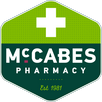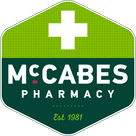Popular skincare myths busted
Forums, blogs and social media are brimming with conflicting skincare advice from unreliable sources. With old wives’ tales and viral skincare trends constantly circulating online, how can we be sure of the correct way to keep our skin clean, protected and glowing? Since the majority of skincare myths cause more harm than good it’s important to differentiate fact from fiction.
Bring in the experts
We asked the following skincare experts to debunk some common myths and share the correct ways to look after our skin:
- Lisa Byrne - superintendent pharmacist at McCabes Pharmacy
- Dr Nicola Ralph – consultant dermatologist at Blackrock Clinic
- Dr Rosemary Coleman – founder of the Centre for Restorative Dermatology
How do you wash your face?

In a survey conducted by McCabes Pharmacy, one in 10 members of the Irish public confessed to not cleaning their face at all.
Lisa Byrne: “There are several myths surrounding skincare and one of the biggest misunderstandings is how to keep the face clean. Many overcompensate or undercompensate with products but it’s important to get the balance right to prevent breakouts and irritation.”
Almost a third of survey respondents said they use soap and water to wash their face. However, harsh detergents in soap can strip the skin of its natural oils, leaving it dry, tight or inflamed.
According to Dr Coleman, the correct way to wash the face is with water in the morning, followed by cleanser and toner in the evening to remove any debris, makeup and dirt.
Dr Coleman: “I don’t believe in double-washing. In the morning you can just wash with water. It’s quite unnecessary to use another cleanser in the morning if all you’ve done is sleep.”
However, some prefer to use cleanser twice a day.
Dr Ralph: “For normal skin that isn’t acne-prone, use a standard gentle facial cleanser, then apply SPF each morning. Repeat this process at night to remove all dirt and oil. For acne-prone skin, apply prescription products to clean, dry skin each evening, followed by a hydrating moisturiser.”
A fifth of survey respondents said they clean their face with a cleanser or cleansing lotion.
Dr Ralph: “For dry skin, ensure products are free from fragrance, SLS, parabens and alcohol. People with eczema-prone skin may require more hydrating moisturisers.”
What water temperature should you use to wash your face?
A fifth of survey respondents said they only clean their face with water. But it’s important to ensure the appropriate temperature is used.
Dr Ralph: “The skin on the face is fragile and extremes of temperature may affect the tiny capillaries, leading to damage of these vessels and resulting in small ‘broken red veins’.”
Hot water can cause dryness, stimulate redness and increase the chance of breaking blood vessels.
Dr Coleman: “At the very most I would wash the face with warm water and finish with a cool-to-cold rinse.”
Is there such thing as over-washing your skin?
Just over one in 10 of the survey’s respondents said they keep their face clean with an exfoliating wash or scrub. However, exfoliants should only be used once a week, rather than daily.

Dr Ralph: “Facial skin should only be washed with gentle cleansers, without exfoliating beads (microbeads). Products that are too abrasive on the skin may result in skin irritation, redness and potential outbreaks of spots. If the skin is overcleaned this will cause dryness and then the oil glands (sebaceous glands) will produce oil to correct this, potentially resulting in spot formation.”
Overuse of exfoliants, cleansers and toners can strip the skin of its essential oils and weaken its natural barriers.
Do you only need to wear SPF during summer?
It's commonly thought that sunscreen is only needed in the summer. However, the sun can still be damaging on a cloudy day and in winter.
Dr Coleman: “I use the term ‘daylight block’ rather than sunblock because you need SPF protection 365 days a year. It’s about forming a habit year-round. You wouldn’t just clean your teeth in the summer.”
A zinc-based sunblock should be used daily as part of a skincare routine. Protection is also still needed if you are working by a window as UV rays can travel through glass.
Dr Ralph: “During an Irish winter, SPF only needs to be applied to the sun-exposed sites, such as face, neck, back of the hands, ears and scalps—particularly in men.”
It’s also vital not to rely on the SPF provided in makeup.
Dr Coleman: “It isn’t as effective. The amount of makeup most of us put on is minuscule. To achieve the SPF on the label you would need to use 2mg of the product per square cm of skin, which we aren’t going to do. The average person will achieve a factor of 19.”
Are anti-ageing products only needed later in life?
Anti-ageing products are designed to help slow down the skin’s ageing process and can be used effectively from age 21.
Lisa Byrne: “A lot of people don’t think they need to apply anti-ageing creams until they’re middle-aged. But by this point it’s too late. Wrinkle cream is a preventative and doesn’t reverse the effects of ageing. However, some products claim to soften the appearance of wrinkles.”

Anti-ageing products can come in the form of eye cream, moisturiser and serums. They often include ingredients such as vitamin C and retinoids.
Dr Ralph adds: “The most important part of anyone’s skincare routine should be the use of SPF which can prevent fine lines and wrinkles. Skin changes begin at approximately the age of 25. However, SPF should be used from childhood.”
Do you need to use day and night skincare products?
Buying the same product in night and day versions may seem pointless without seeing the results.
However, certain ingredients are more effective at different times of the day. For instance, skin should be protected from sunlight and pollution during the day, while at night it should be nourished and soothed.
Dr Ralph: “Most anti-ageing creams contain retinoids, therefore they should be applied at night and not used in the morning as they make skin sun-sensitive. Hydrating moisturisers or products with hyaluronic acid are good at night as they have more time to soak in without being touched.”
Are facial wipes bad for your skin?

In the McCabes Pharmacy survey, 6.3% of people admitted to using face wipes to keep their skin clean. However, the myth that these aren’t good for your skin is completely correct.
Dr Coleman: “I hate makeup wipes. They cause so many [skincare] problems, especially with rosacea, Demodex and folliculitis. They should strictly be used for an overnight stay or when on the run. They are not good skincare.”
Facial wipes often contain chemicals and alcohol, which can have a drying effect on the skin.
Dr Ralph: “This may lead to more oil production by the sebaceous glands, which can lead to acne breakouts. People who suffer from sensitive skin or eczema may be more likely to get flare-ups of their dermatitis if products containing chemicals and alcohol are used on the sensitive facial skin.”
Can toothpaste heal spots?
Putting a blob of toothpaste on angry spots is an age-old trick used by many teenagers. Although it can see results, the negative effect is likely to outweigh the positive.
Dr Coleman: “Toothpaste can dry out spots because of the hydrogen peroxide in it. But we don’t recommend it because it can dry out the skin.”
Toothpaste can also clog the pores, leading to even more spots. It can also cause a burning sensation. Although it can dry out a spot, there are far better over-the-counter spot treatments available.
Forming a skincare regimen can be confusing without knowing what works and what doesn’t. It’s easy to be led astray by myths, leaving you with an unnecessarily lengthy routine. However, following expert advice will ensure you don’t waste your time or money trying unsuitable cosmetics.

